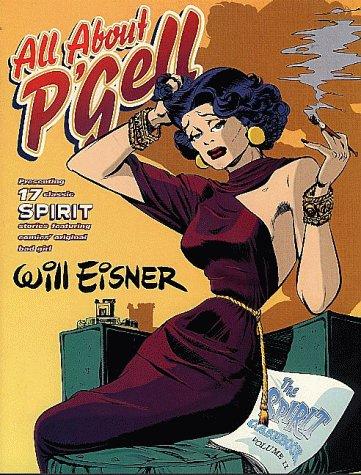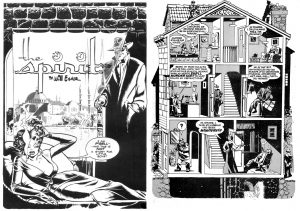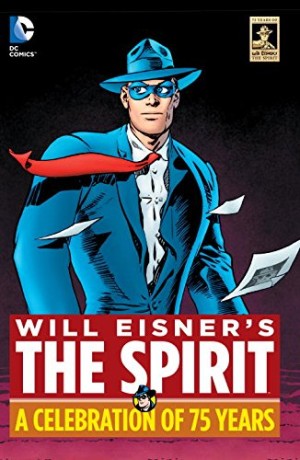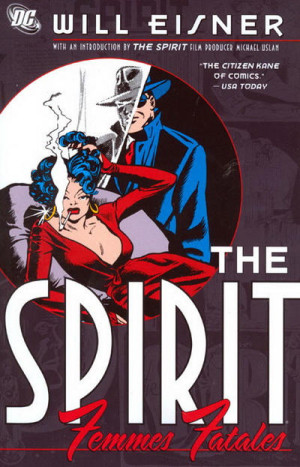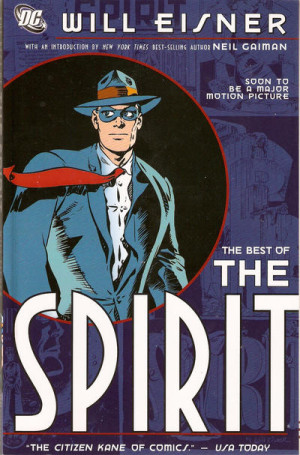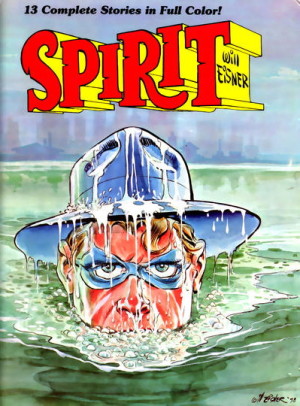Review by Frank Plowright
All 1940s and 1950s stories featuring French siren P’Gell’s encounters with the Spirit are featured in this hardcover collection, but it’s an interesting decision to downplay the Spirit in favour of the alluringly posed cover that barely acknowledges his presence.
The voluptuous P’Gell was introduced to the Spirit’s newspaper supplement in 1946, the tone set from the start with her draped in what was surely a daringly low-cut dress for the times, announcing her story is not for little boys (sample art left). US soldiers who’d seen wartime service in France would instantly make the connection with the Parisian district of Pigalle, known as an area where prostitution occurred. Indeed, as hinted at over several strips, P’Gell uses what nature endowed her with to lure wealthy men, amusingly drawn by Eisner as a succession of hapless, lovestruck elderly types, not destined to be around for very long. P’Gell wants a certain lifestyle, and every husband that meets with an untimely ‘accident’ increases her wealth. Unfortunately, that pesky Spirit is so often around to investigate the circumstances.
From the start Eisner sets up a clever sexual dynamic, with neither protagonist blind to the other’s allure, but each having a greater priority. For the Spirit it’s justice, and for P’Gell it’s the acquisition of wealth. However, when it comes to the Spirit she maintains a slight decorum, and is more inclined to leave him unconscious than dead.
Eisner knew what he’d created, and P’Gell’s return is only a month after her introduction, and a month later she’s back again, and again a month after that. Eisner is aware enough to know he can’t repeat the same joke over and over, so in one of the best stories, P’Gell becomes stepmother to the precocious Saree Lee while running an exclusive school. Drama Queen Saree adds a new tone to subsequent stories.
Gathering all P’Gell’s appearances chronologically does show diminishing returns, and her use in stories from the 1950s isn’t as polished. Neither is the art. Klaus Nordling is fine, but while Jim Dixon and Al Wenzel can mimic Eisner’s drawing style they don’t have his imagination, and their pages are plain compared with his. Jules Feiffer’s plots, especially one in French, do work.
By the 1970s people who remembered the Spirit newspaper strip fondly were publishers themselves, one being Denis Kitchen, who’d be instrumental in introducing the Spirit and Eisner to a new audience in the 1970s and 1980s. In 1972 he not only persuaded Eisner to let him republish some P’Gell stories in comic form, but to draw a new adventure. Eisner acknowledges more liberated times by having P’Gell appeal to women and men, and while not the finest contribution to the collection, it’s clever, packs a lot into four pages and showcases a different artistic approach.
The ideal way to sample the Spirit is in the Archives series, but their production quality is reflected in the price, so interested readers could do far worse than pick up this along with the other samplings recommended below.
